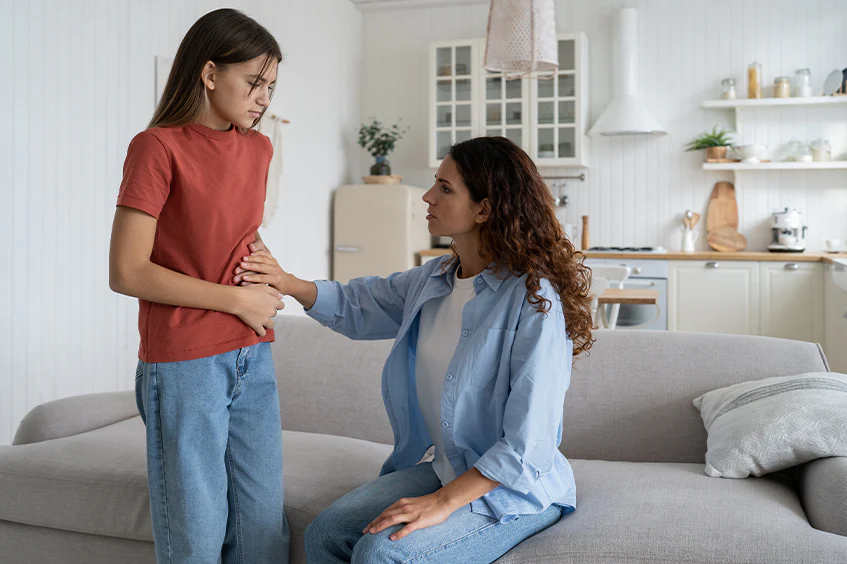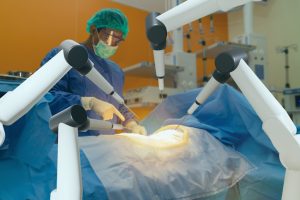The teenage years mark a critical transition in a girl’s life, bringing with them a whirlwind of physical, emotional, and hormonal changes. One of the most significant milestones is the onset of menstruation, commonly referred to as a girl’s first period or menarche. However, with the beginning of this monthly cycle often comes uncertainty — especially when periods are irregular.
Many parents and teens wonder: Is it normal to have irregular periods in adolescence? When should one worry? To help answer these important questions, we spoke with Dr. Shweta Mendiratta, a leading gynecologist and adolescent health expert. With years of experience in treating young girls and women, Dr. Mendiratta is widely regarded as the best doctor for irregular periods treatment in Faridabad.
What Are Irregular Periods?
An irregular period is when the menstrual cycle varies significantly from month to month. While a typical cycle ranges from 21 to 35 days, many teens experience cycles that are shorter, longer, or unpredictable in the first few years after menarche.
Common signs of irregular periods include:
- Skipping months altogether
- Having two periods in one month
- Extremely heavy or light flow
- Bleeding that lasts longer than 7 days
- Severe cramping or spotting between periods
Why Are Periods Often Irregular in Teens?
According to Dr. Shweta Mendiratta, it’s quite normal for menstrual cycles to be irregular during the first 2–3 years after a girl starts menstruating. This happens because the hypothalamic-pituitary-ovarian (HPO) axis, which regulates the cycle, is still maturing.
“During adolescence, the body is learning to regulate hormones like estrogen and progesterone. Until ovulation becomes regular, periods may come early, late, or skip altogether,” explains Dr. Mendiratta.
What’s Normal?
Here’s what can be considered normal for teens:
- Irregular cycles for 1–3 years post menarche
- Cycle length fluctuations from 21 to 45 days
- Mild cramps, breast tenderness, and mood changes
- Occasional missed periods, especially with stress or illness
- Variation in flow — some cycles may be heavier or lighter than others
What’s Not Normal?
While some irregularity is expected, persistent irregularities or extreme symptoms could signal an underlying issue. Dr. Shweta Mendiratta advises teens and parents to watch out for the following red flags:
- No periods for more than 3 months (amenorrhea)
- Periods lasting longer than 7 days consistently
- Very heavy bleeding (changing pad every 1–2 hours)
- Severe pain that interferes with daily activities
- Facial hair growth, severe acne, or sudden weight gain
- Signs of eating disorders or excessive weight loss
These symptoms may be signs of conditions such as Polycystic Ovary Syndrome (PCOS), thyroid disorders, or bleeding disorders, all of which require medical evaluation and treatment.
Common Causes of Irregular Periods in Teenagers
Dr. Shweta Mendiratta, who has successfully treated hundreds of teens with menstrual issues in Faridabad, outlines the most common causes:
- Hormonal Imbalance: This is the most frequent cause in adolescents. The body may take time to establish a regular ovulation pattern.
- Polycystic Ovary Syndrome (PCOS): A hormonal condition characterized by irregular cycles, acne, obesity, and excess body hair.
- Thyroid Disorders: Both hyperthyroidism and hypothyroidism can disrupt the menstrual cycle.
- Stress and Emotional Health: Academic pressure, peer relationships, and personal changes can all impact hormone levels.
- Eating Disorders & Excessive Exercise: Teen athletes or those with anorexia/bulimia may experience missed or irregular periods.
- Chronic Illnesses: Conditions like diabetes or celiac disease can also affect menstrual health.
Why Timely Medical Help is Important
Ignoring irregular periods can lead to complications in the long run, such as fertility issues, anemia, and bone health problems due to estrogen deficiency.
Dr. Shweta Mendiratta, recognized as the best doctor for irregular periods in Faridabad, emphasizes the importance of early diagnosis and intervention. “Timely treatment not only helps in regulating periods but also boosts a girl’s confidence and reduces anxiety about her health,” she adds.
What to Expect During a Medical Consultation
When you visit Dr. Mendiratta’s clinic in Faridabad, here’s what typically happens:
- A detailed menstrual history is taken.
- Physical examination and BMI assessment are done.
- Blood tests may be advised to check for hormonal levels, thyroid function, or iron deficiency.
- Pelvic ultrasound may be recommended if PCOS is suspected.
- Counseling on diet, lifestyle, and stress management is provided.
Dr. Shweta Mendiratta ensures that teenage patients are treated with sensitivity, privacy, and care — creating a safe space for them to speak openly about their concerns.
Lifestyle Tips for Teens with Irregular Periods
Whether your periods are normalizing or need medical attention, these tips can support menstrual health:
✅ Eat a balanced diet with iron-rich foods like leafy greens, lentils, and eggs
✅ Maintain a healthy weight – both obesity and underweight can impact cycles
✅ Manage stress with yoga, meditation, or journaling
✅ Exercise regularly, but don’t overdo intense workouts
✅ Track your cycle using a calendar or app to observe patterns
✅ Get enough sleep — 7–8 hours a night supports hormonal regulation
Final Thoughts
Irregular periods are a common part of adolescence, but they shouldn’t be ignored if symptoms are persistent or severe. With the right guidance and care, teens can regain control over their menstrual health and prevent long-term complications.
If your daughter is experiencing irregular periods, don’t delay seeking expert help. Dr. Shweta Mendiratta, with her extensive experience and compassionate approach, offers the best irregular periods treatment in Faridabad. She works closely with teens and parents to provide accurate diagnosis, effective treatment, and emotional support every step of the way.
Book a Consultation with Dr. Shweta Mendiratta
📍 Location: Faridabad
📞 Call Now: +91-8130048652,+91-9999093503, +91-8178939442
🌐 Website: https://drshwetamendiratta.com/
Dr. Shweta Mendiratta – Because every young girl deserves a healthy start to womanhood.



